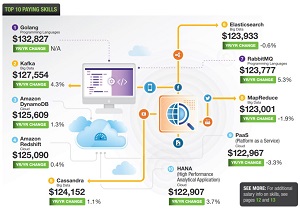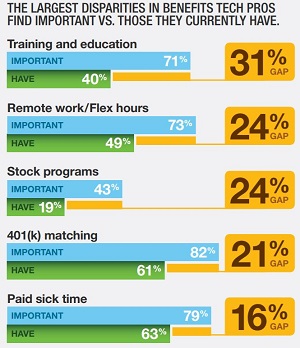News
AWS Cloud Skills Pay Off, Tech Salary Report Says
Cloud skills are paying off in today's tech sector, a new report from careers site Dice says, with Amazon-related skills among the most profitable.
In fact, AWS services are strewn throughout the top-paying skills list, even taking two of the top five salary slots. Placing No. 3 on that list is Amazon DynamoDB, followed by Amazon Redshift, both providing more than $125,000 as an average salary.
The top five entries on that list are:
- Go programming language (Golang): $132,827
- Kafka: $127,554
- Amazon DynamoDB: $125,554
- Amazon Redshift: $125,090
- Cassandra: $124,152
Overall, Dice's annual tech salary study shows low unemployment and stagnant salaries, with other considerations beyond salary affecting job choices among developers and other pros who seem increasingly willing to move on.
That latter point is highlighted by a section of the newly published Dice 2019 Salary Report from the tech careers specialist titled "It's Not Only About Money."
"70 percent of tech professionals would take the same job with a different company for as little as a 15 percent salary increase," the report says. "Offering programs that boost job satisfaction may be just as important as hard cash to attract and retain talent."
Nevertheless, salaries remain the focal point of this type of survey, still more important than training, work-life balance, perks such as remote work and so on to the tech pro respondents, who seem to have a strong developer presence.
And on that salary front, Dice said wages remained stagnant despite low unemployment.
"Average annual salaries in 2018 remained flat, at $93,244. That's a mere 0.6 percent increase from 2017," Dice said in a post last week (Jan. 29). "No wonder some 68 percent of respondents to Dice's survey said they'd change employers to receive higher compensation. (Some 47 percent said they'd switch jobs for better working conditions, while 34 percent said they'd do so for more responsibility; another 22 percent thought they might lose their current position, necessitating a job switch.)
"But even if companies can't (or won't) find the funding to pay tech pros radically bigger salaries, they can still offer enticing non-salary options such as training and education, remote-working benefits, and flexible schedules."
Despite those non-salary concerns, "increased compensation" was listed as the primary motivator provided by employers in 2018 (17 percent of respondents), followed by "flexible work location/work remote" (15 percent), and "flexible work hours," which tied with "more interesting or challenging work" at 10 percent of respondents.
For those whom it is about the money, the top-paying skills were:
 [Click on image for larger view.]
Top-Paying Skills (source: Dice)
[Click on image for larger view.]
Top-Paying Skills (source: Dice)
In addition to DynamoDB and Redshift listed above, other AWS-related skills on the top-paying tech list include:
- No. 12 -- Amazon Redis: $122,592
- No. 20 -- Amazon Route 53: $120,091
- No. 58 -- Amazon CloudFront: $113,459
- No. 70 -- Amazon S3/AWS (Simple Cloud Storage Service): $112,354
Various other cloud skills not specifically related to AWS also made the list, of course, such Infrastructure-as-a-Service (IaaS), Platform-as-a-Service (PaaS) and many others.
While salaries are still the primary factor in choosing a job, other motivating factors behind higher compensation (68 percent), were "better working conditions" (47 percent), "more responsibility" (34 percent), "anticipate losing current position" (22 percent), "shorter commute" (18 percent) and "relocation" (13 percent).
The report also investigates the disparities between what benefits tech pros find important and the benefits they have. That led Dice to advise organizations that promoting training and education is a good way to attract top tech talent.
 [Click on image for larger view.]
Top-Paying Skills (source: Dice)
[Click on image for larger view.]
Top-Paying Skills (source: Dice)
"In 2018, 71 percent of tech professionals said that training and education are important to them, but only 40 percent currently have company-paid training and education -- that's a 31 percent gap between what's desired and what's offered," the report said.
"This gap is further illustrated by the fact that far more tech professionals (45 percent) who are satisfied with their job receive training, while only 28 percent of those who are dissatisfied with their job receive training."
Art Zeile, CEO of DHI Group Inc., the parent company to Dice, also weighed in: "Offering skill-enhancing training keeps employees at the top of their game and could ease the minds of professionals wanting to feel motivated and invested,"
Other highlights of the report include:
- Salary satisfaction has declined over the years, with 57 percent of respondents reporting they were satisfied in 2017, which has dropped to 48 percent in 2018.
- Confidence in finding a favorable position next year increased from 60 percent of respondents expressing such confidence in the 2017 survey to 63 percent in the 2018 survey.
- The average U.S. salary was $93,244, up 0.6 percent from the previous year.
- Tech management positions topped the salary list at $142,063. At No. 25 was PC/service technician, $41,310.
- 21 percent of respondents said they would prefer to work remotely; 23 percent said they never work remotely.
- 33 percent of respondents said they would take up to a 10 percent pay cut to work remotely; 48 percent said they wouldn't take a pay cut.
- Reasons for tech pros seeking a new job are "seeking higher salary" (68 percent), "seeking better working conditions" (47 percent) and "seeking more responsibility" (34 percent).
- "Lack of recognition" was cited as the No. 1 reason for employee burnout (36 percent), followed by "workload" (35 percent), "unchallenging/monotony" (28 percent), "work-life balance" (26 percent) and "friction with boss" (18 percent).
The report also covers certifications, top tech metro areas by salary and other factors, top industries by salary, and salaries broken down by state, level and experience.
"Tech pros may find their managers more willing to negotiate over flexible scheduling (to name just one non-monetary benefit) than salary, especially if a company is already wrestling with tight budgets," Dice said. "As we head deeper in 2019, consider what you might want besides money. Your boss could prove surprisingly amenable to your request."
The survey report is based on the polling of 10,780 employed technology professionals responding to an online Dice.com survey between Oct. 22, 2018, and Dec. 13, 2018. The survey was publicized in multiple ways. Full methodology is listed at the bottom of the free report, which comes in a PDF download upon providing registration information.
About the Author
David Ramel is an editor and writer at Converge 360.